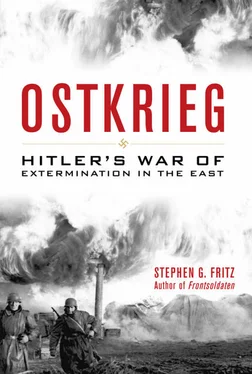Fearful of Soviet blackmail, and sensitive to threats to their vital supplies of oil and other key raw materials, German officials increasingly viewed Soviet actions in Eastern Europe with alarm. Since Germany absorbed most of the agricultural exports of the Baltic countries and Rumanian oil was absolutely vital to the German war economy, Soviet moves in these areas were at best inconvenient and at worst, as the German Foreign Office noted, “a serious danger for us in so far as these essential supplies are concerned.” With Western Europe insufficient as a source of Lebensraum and serious fuel and food shortages looming in the occupied areas, German officials realized anew that only the Soviet Union possessed the raw materials needed to sustain the war economy. The economic arguments for action in the east were made explicit in a 28 July memorandum by Rear Admiral Fricke, “Observations on Russia.” In it, he stressed that Germany’s security required “the most self-sufficient economy possible, especially with regard to commodities vital in war.” These materials were to be found in sufficient quantities only in Russia. For Fricke, moreover, “the strong economic pressure” emanating from Germany’s giant neighbor, its threatening economic position in the Baltic and Southeastern Europe, and “the spirit of Bolshevism” compelled Germany to liquidate “this chronic danger.” 21
Whether Hitler ever saw Fricke’s memo is uncertain, although Raeder likely outlined its main ideas for him. In any case, he had long believed in the necessity of territorial expansion in the east. By late July 1940, then, the logic of the strategic, military, economic, and political situation seemed to be pointing in one direction: an attack on the Soviet Union. The increasing frustration at the stalemate with Great Britain, concern over growing American power, and fear of losing the military-political initiative resulted in a self-imposed time pressure in Hitler’s mind: time was not on his side, as the enemies of Germany were growing stronger daily, so a decision one way or another had to be made. To the Führer, a strike eastward offered the tantalizing possibility of solving all Germany’s problems simultaneously. Economically, the dream of Lebensraum would be fulfilled; politically, a fatal blow would be struck at Jewish-Bolshevism; and, strategically, Britain’s last two hopes would be eliminated. Not only would Russia be annihilated, but the resultant increase in Japanese power in the Pacific would also force the United States to turn its attention away from Europe. Deprived of its twin swords, Britain would have no choice but to make peace. Less than a week after the inconclusive conference on 21 July, Hitler informed Jodl of his decision to launch a surprise attack on the Soviet Union at the earliest possible moment, May 1941, in order “once and for all” to eliminate the Bolshevik danger from the world. War with the Soviet Union was unavoidable, Hitler remarked, so it was better to have it now, at the height of German power, than to wait. The next day, economic officials briefed Hitler on the mounting problems facing Germany, which merely confirmed the Führer in his decision. 22
When Hitler called Field Marshal Brauchitsch, General Halder, Admiral Raeder, Field Marshal Keitel, and General Jodl to a gathering at the Berghof on the last day in July, then, he intended not to ask their advice but to inform them of the decision he had made. Ironically, much of the conference was devoted to an intense discussion of Operation Sea Lion. While army leaders pressed for action against Britain directly or through operations in the Mediterranean, Raeder expressed serious reservations about any cross-Channel invasion in September, proposing instead a postponement until the spring. Hitler, too, appeared mindful not only of the enormous risks of an invasion but also of the dangers in delaying the operation, since the British position could only improve with the passage of time. Nonetheless, he reassured Raeder that a landing would be attempted only if the air campaign against Britain proved successful. When Brauchitsch pressed for action in the Mediterranean in support of the Italians, Hitler dismissed the suggestion as a diversionary maneuver, one that depended on the problematic staying power of the Italians. 23
What, however, would be done if an invasion did not take place? In that event, Hitler asserted, “our action must be directed to eliminate all factors that let England hope for a change in the situation.” He now revealed his preference for a swift decision in the east to a war of attrition against the British Empire. “ Britain’s hope lies in Russia and the United States ,” Halder noted, retaining the Führer’s emphasis in his diary:
If Russia drops out of the picture, America, too, is lost for Britain, because elimination of Russia would tremendously increase Japan’s power in the Far East. Russia is the factor on which Britain is relying the most …. With Russia smashed, Britain’s last hope would be shattered . Germany will then be master of Europe and the Balkans. Decision: Russia’s destruction must therefore be made a part of this struggle. Spring 1941. The sooner Russia is crushed the better . Attack serves its purpose only if Russian state can be shattered to its roots with one blow…. Resolute determination to eliminate Russia…. Object is destruction of Russian manpower.
Although Hitler justified his decision with reference to strategic arguments, this was, as Barry Leach has noted, a weak charade: a German attack was the most certain way to bring about the alliance he professed to fear. The key to Hitler’s thinking lay instead in his emphasis on the absolute destruction of the Soviet Union, a necessity if Germany was to be able to fight and win a protracted war of attrition against the Western democracies. 24
War against the Soviet Union, which had formed the core of Hitler’s ideological-racial conceptions for years, now assumed the key role in his comprehensive military-strategic-economic outlook: victory in the east would cut the Gordian knot and allow Germany at last to break free of its external constraints. Ideological obsessions had now come to the fore. As Goebbels noted after a conversation with Hitler on 9 August, “Bolshevism is world enemy number one…. The Führer thinks so too.” Noteworthy as well was the absence of any opposition to Hitler’s plans from the army leadership, in distinct contrast to the mood of autumn 1939, when he had faced an incipient revolt with his determination to attack France. Traditional disdain for the Slav, fear and contempt of Bolshevism, agreement on the necessity of securing the economic resources of the east, the long-term threat of Russia to German hegemony, the temporary weakness of the Red Army owing to Stalin’s purges, belief in German military superiority: the Army High Command shared all these attitudes with Hitler and, thus, saw no reason to object to his momentous decision. Time was also a factor. If Hitler was to retain the strategic initiative and realize his goal of living space in the east, he had to act now, before the United States mobilized its extraordinary potential might. Strategic, economic, and time factors thus reinforced Hitler’s fundamental inclination: the struggle for Germany’s existence would be won or lost in the east. In this case, calculation and ideology, rational thought and dogma, proved complementary, a fact that must have convinced Hitler of the correctness of his decision. 25
Hitler’s 31 July decision to attack the Soviet Union was not confirmed in a military directive until 18 December. In the interim, the Germans muddled through a period of strategic confusion during which they squandered the momentum of their earlier triumphs and struggled to regain the initiative. Having decided to strike at Russia in the spring of 1941, they now found it desirable to force Britain to make peace in order to eliminate the threat of a two-front war. None of the options at hand offered the prospect of a quick victory, a fact that Hitler both understood and had difficulty accepting. Over the next four months, the Germans pursued a variety of means by which to compel Britain to surrender, even as Hitler, at the height of his power, again lapsed into typically vacillating behavior, preferring to choose not to choose. Military planning, Halder complained in exasperation on 27 August, went in all directions: “Spain is to be brought into war, but the economic consequences… are ignored. North Africa is viewed as a theater of operations against Britain…. Rumania is to be drawn into our orbit…. We are going to be ready in the north when Russia attacks Finland. The army is supposed to have everything nice and ready without ever getting any straightforward instructions.” Strategically, only two realistic alternatives emerged: the creation of a Eurasian continental bloc and a peripheral war in the Mediterranean. 26Although both these ideas were complementary in that they were directed against the Anglo-American powers, they differed crucially in their attitude toward the Soviet Union.
Читать дальше












